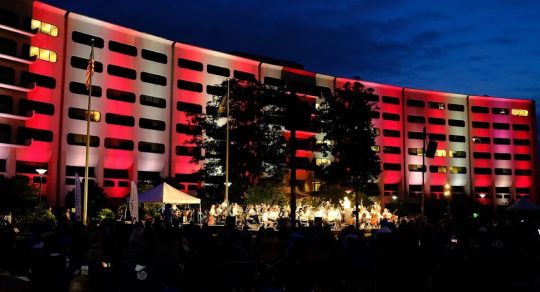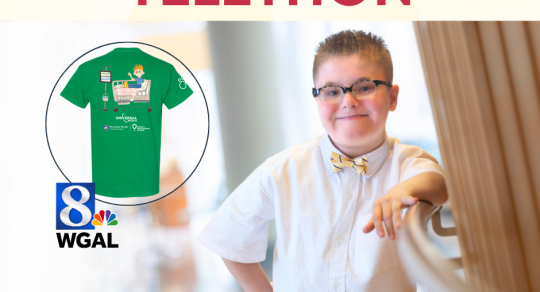Fellowship
Pediatric Critical Care
The Pediatric Critical Care Fellowship at Penn State Health Children's Hospital is a three-year, ACGME-accredited program that admits one fellow per year.
Explore More
Penn State Health Children’s Hospital has active programs in all aspects of pediatric medicine and surgery, including trauma, transplantation and cardiothoracic surgery. In addition to being the region’s only pediatric Level I trauma center, the Children’s Hospital offers invasive and non-invasive cardiorespiratory monitoring, conventional and non-conventional mechanical ventilation, renal replacement therapies, and extracorporeal membrane oxygenation. Comparisons to pediatric intensive care units nationwide, demonstrate that this pediatric intensive care unit has a severity-of-illness adjusted mortality that ranks among the highest in the nation, allowing for an expansive clinical experience for physicians in training.
The pediatric congenital heart surgery program has been repeatedly nationally recognized for outstanding surgical results, receiving a three-star rating (the highest possible) from the Society of Thoracic Surgeons. The hospital also boasts a busy and established adult congenital heart disease program.
The pediatric intensive care unit moved to a new, state-of-the-art physical space in 2013 with 18-bed capacity, and expanded to 22 beds in 2020.

Program Overview
Of note, the pediatric intensive care unit bed capacity can be deceiving, as Penn State Health Children’s Hospital also has a separate pediatric intermediate care unit, staffed by non-PICU physicians, which cares for less acute patients that are often cared for in other larger intensive care units, thus the average acuity of the patients admitted to the PICU is higher than would be expected.
The program accepts one fellow each year, so fellows are able to enjoy a patient-to-fellow ratio comparable to larger training programs while fostering the development of a closer working relationships with critical care faculty.
The Pediatric Critical Care Medicine Fellowship is structured to prepare trainees for careers in either academic medicine or private practice.
Learn more about the Fellowship
Dear potential future fellow,
Thank you for your interest in our program and congratulations on choosing a career in pediatric critical care. While we are a relatively young training program (founded in 2009), our fellowship provides fellows with a combination of diverse clinical opportunities and world-class scholarly mentorship that prepares them for careers as academic pediatric intensivists. Penn State Health Children’s Hospital is one of very few hospitals in the country (and per our understanding, the only one in the northeastern United States) with a pediatric intermediate care unit that is not managed by intensivists. Thus, while we are a medium-sized unit, fellows in our PICU are exposed to a highly acute patient population that yields a very rich learning experience.
Being a small fellowship, our fellows are looked to as integral members of the clinical team from the beginning of their fellowships and so our program tends to attract fellows that are comfortable taking ownership of all aspects of patient care. The faculty pride themselves on getting to know each of our fellows very well so that each fellow gets a personalized experience that takes advantage of their individual strengths and helps them shore up any weaknesses they may have. I am proud to say that we maintain a 100% board-pass rate and that our graduates have all progressed to successful academic careers of their own.
I invite you to explore the information we have included below to learn more about our program. Please do not hesitate to contact me with any questions.
Elizabeth Kerris, MD
Program Director, Pediatric Critical Care Fellowship
General Application Information
Penn State College of Medicine participates with ERAS and the NRMP Match. All application material must be submitted through ERAS.
Applicants with suitable qualifications will be invited to interview and visit with the department.
To allow sufficient time for applications to be reviewed and decisions made regarding interview offers, the application deadline is Sept. 15.
Application Details
All applications will be reviewed in their entirety, and an invitation to interview is based on the entire application and not simply exam scores. However, the program has the following preferences and requirements:
USMLE is not required for those who have taken COMLEX; however, osteopathic graduates are encouraged to take USMLE Step 1 as it will add to their qualifications.
Applications must include at least three and no more than four letters of recommendation (including at least one letter from a pediatric intensivist), medical school transcripts, curriculum vitae and personal statement.
The institution accepts residents on J-1 visas only. The visa application process and applicable fees are the applicant’s responsibility.
The recruitment team prefers to see completion of pediatric residency within three years of submitting the ERAS application. However, this is dependent upon what clinical/research experience the applicant has had since completing their residency. Please reach out to program director with any specific questions.
Couples Matching
If someone who is invited to interview is couples-matching with an applicant interviewing with another department at Penn State Health Milton S. Hershey Medical Center, the Division of Pediatric Critical Care will be happy to help coordinate with the other departments/divisions as much as possible. Applicants in this situation should contact the program office about their partner’s interview, as the program may not have the information.
Interview Process
The program's typical interview season begins in late August and continues through October. The interview process is designed to put the applicant at ease and provide each candidate with detailed information about the program.
COVID-19 Update for the 2023 Interview Season
In accordance with national recommendations and in fairness to all fellowship candidates, many of whom are under travel restrictions, in-person visits and interviews will be suspended again for the 2023 interview season.
A Commitment to Teaching
Over the years, Pediatric Critical Care Medicine has attracted and cultivated an outstanding faculty team, each with academic and clinical interests that serve as a focus for their teaching and research endeavors. A number hold or are seeking additional graduate degrees, which is evidence of their commitment to advancing the field of pediatric critical care medicine. Research interests are wide ranging, from basic science to clinical investigation, as well as in the areas of education, simulation, pharmacology, ultrasound, medical informatics and safety/quality improvement. The department has achieved a nationwide reputation for academic excellence. The program is privileged to have Neal Thomas, MD, MSc, in the division. Dr. Thomas is not only the associate dean for clinical research at Penn State College of Medicine, but also an internationally known pediatric critical care clinical researcher who serves as a primary research mentor for all of fellows.
Meet the Faculty
Current Fellows

PGY-6 Fellow, Pediatric Critical Care Fellowship

PGY-5 Fellow, Pediatric Critical Care Fellowship
Leadership


Program Coordinator, Pediatric Fellowships, Pediatrics

Program Coordinator, Pediatric Fellowships, Pediatrics
Supporting Your Training
Curriculum Details
The 36-month fellowship training program is divided into four-week blocks (13 blocks per year), as follows:
One four-week block of pediatric anesthesia during the first year
18 blocks of clinical service in the pediatric intensive care unit
20 blocks of research
Training in a mixed unit means fellows in the program are consistently exposed to CT surgery/CICU patients. Additional exposure to the management of patients with congenital heart disease is obtained from experiences in the operating room with congenital heart surgeons, cardiac anesthesiologists and perfusionists. Fellows also spend time in the cardiac catheterization lab and the echocardiogram reading room to further their understanding of cardiac anatomy and physiology.
There is some flexibility that can be applied to accommodate special interests during clinical months (such as outside clinical rotations or participating in the cardiothoracic surgery trip to Ecuador), which will be considered and arranged on a case-by-case basis.
Four weeks per year of vacation may be divided during the research rotations.
Dedicated Education Time
The clinical schedule is designed so that fellows are always able to attend fellow education sessions, with Mondays designated as protected fellow educational days. On Mondays, fellows are exposed to a number of different fellow-specific learning topics. The Department of Pediatrics also hosts monthly fellow core curriculum sessions for all pediatric fellows across the institution to cover aspects of academic medicine that are shared across the subspecialties (scholarship, biostatistics, medical education, ethics, job searches, etc.) Divisional conferences, including morbidity and mortality conferences, research conference, ethics conferences, case conference and journal club, occur on Thursday afternoons. Fellows are key participants and presenters in these sessions as well. Finally, simulation sessions are regularly conducted both in situ and in the Clinical Simulation Center to further augment fellows' educational experiences.
Additionally, first-year fellows attend the regional pediatric critical care first-year fellow boot camp at Children's Hospital of Philadelphia every July. Second and third-year fellows attend the senior pediatric critical care fellow boot camp at Johns Hopkins University every other year. The program also regularly integrates web-based educational material into the curriculum.
Pediatric Grand Rounds
Grand Rounds are held every Tuesday morning from 7:30-8:30 a.m. Presenters include faculty (both within and outside the department and institution), fellows and residents. These programs are designed to be of interest to the entire department, as well as pediatricians from regional hospitals.
PCCM Case Conference
PCCM Case Conference is held approximately 10 times per year. Fellows take turns leading a case discussion for the entire Pediatric Critical Care team, with topics covering clinical decision-making, novel or rare case presentations and ethical dilemmas.
PCCM Journal Club
Journal Club is typically held once or twice a month. Members of Pediatric Critical Care, including fellows, take turns choosing and moderating discussions of recent articles from one of the major critical care publications.
PCCM Division Meeting
Division meeting are held approximately once a month. This is an opportunity for the division leadership to update the division on clinical, educational, and academic changes, and elicit discussion of proposed patient care protocols, equipment changes, staffing models, etc.
PCCM Research Conference
Research conference is typically held four times per year. Updates are made regarding division participation in larger multi-center trials. Members of the division take turns briefly and informally discussing active and potential clinical research projects. The purpose of these discussions is to elicit broad comment on research proposals in the early stage of planning and facilitate submission of proposals for approval/funding.
PCCM Morbidity and Mortality Conference
M&M is typically held once a month. Members of the division take turns reviewing cases and presenting them to the division, with the goal of identifying opportunities for practice improvement.
In Situ PICU Simulation
Fellows participate in monthly simulation sessions conducted in a patient room in the PICU, along with residents, APPs, PICU nurses and respiratory therapists.
Pediatric CT Surgery Case Conference
Pediatric Critical Care participates in case discussions with the Children’s Heart Group.
Children's Hospital Mock Code
Mock codes are typically held once a month. Sessions are designed to:
Evaluate for system issues within the Children’s Hospital
Provide educational experiences for responding fellows, residents, nurses, and respiratory therapists. On service pediatric critical care fellows are expected to respond to these as part of the pediatric code team and lead the resuscitation.
PCCM Unit Hand-off Educational Rounds
Attending physicians transition service on Tuesday afternoons. The entire division attends to hear the patient hand-off, with the goal of fostering discussion regarding patient management decisions. Beginning their second year of fellowship on service, fellows are responsible for leading these discussions.
Trauma Case Review and Child Protection Team Case Review
Pediatric Trauma and Child Protection teams review specific cases, many of which were patients admitted to the PICU.
Training in scholarly and research skills is provided by combination of didactic lectures by the Department of Pediatrics fellow core curriculum and oversight by each fellow’s Scholarly Oversight Committee and research mentor. Fellows are free to choose their own scholarly projects based on their own academic interests, with guidance given as needed to ensure fellows each find interested and relevant research mentor(s).
Fellows have had tremendous success at achieving our program’s stated goal, which is the completion of a project that results in a manuscript submitted for publication by the end of their fellowships. Third-year fellows are expected to present their research at the Society of Critical Care Medicine Annual Congress. Fellows have also presented at the Pediatric Academic Societies conferences, as well as other national conferences.
Interested fellows have also attended the Pediatric Acute Lung Injury and Sepsis Investigators conferences, which offer fellow-specific workshops in clinical research.
Finally, fellows can choose to take advantage of other opportunities via Penn State, including (but not limited to) graduate coursework, additional training in medical education and/or certification as a simulation instructor via the Clinical Simulation Center.
Fellow Year One
Orientation: One block
PICU: Seven blocks
Research: Four blocks
Anesthesia: One block
Fellow Year Two
Research: Seven blocks
PICU: Six blocks
Fellow Year Three
Research: Nine blocks
PICU: Four blocks
Fellow Honors and Recognitions
The annual Resident/Fellow Research Day is held each year (with exception of during the COVID-19 pandemic) on and around the Penn State Health Milton S. Hershey Medical Center campus.
The intent of the event is to provide an opportunity for residents and fellows to showcase their research accomplishments to their peers in other clinical departments, as well as their colleagues in the basic sciences.
Contact Information
Mailing Address
Penn State Health Children’s Hospital
Pediatric Critical Care Fellowship
600 University Dr.
Mailcode H085
Hershey, PA 17033
General Contact Info
Phone: 717-531-5458
Email: bschwarz@pennstatehealth.psu.edu



